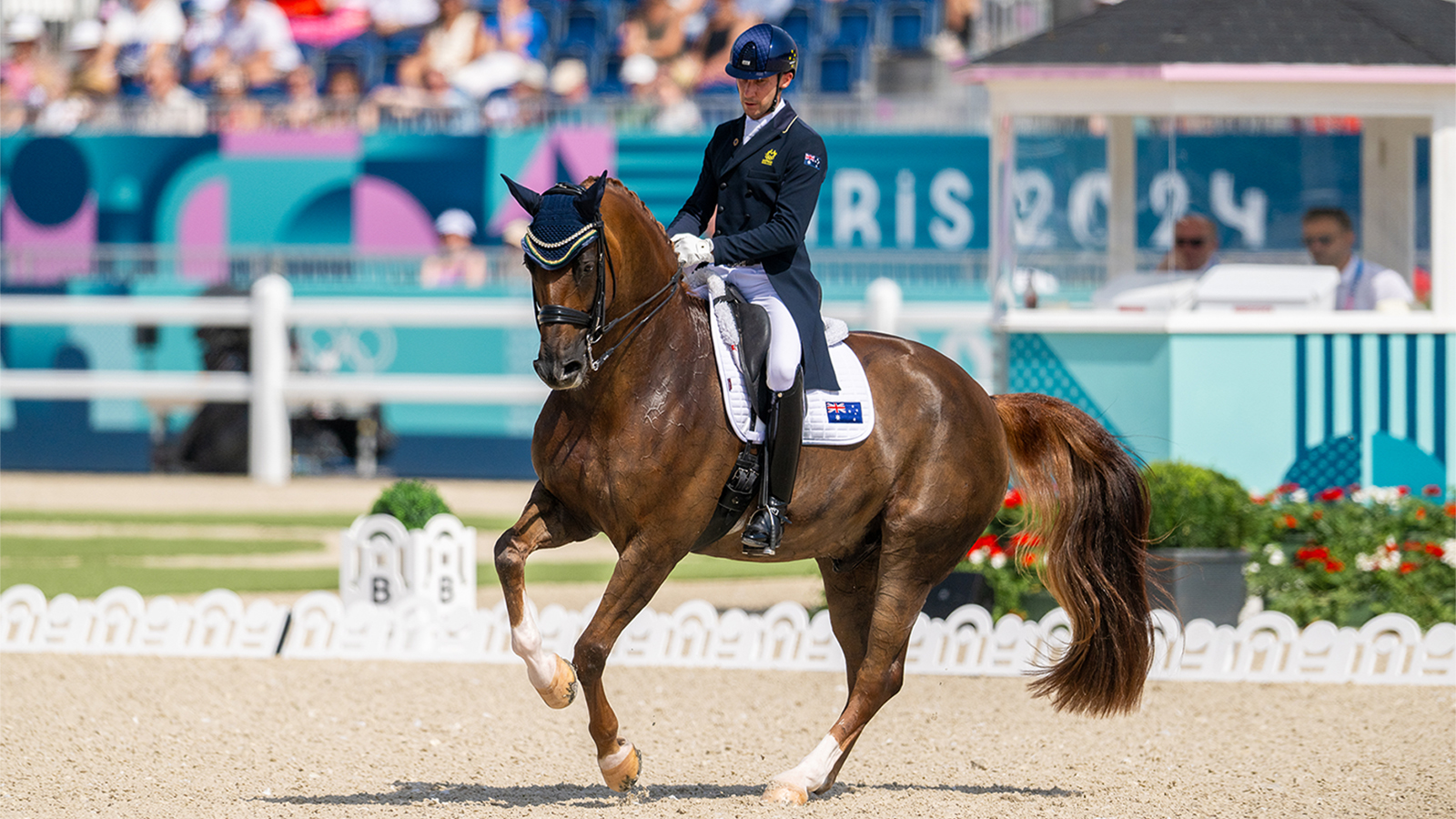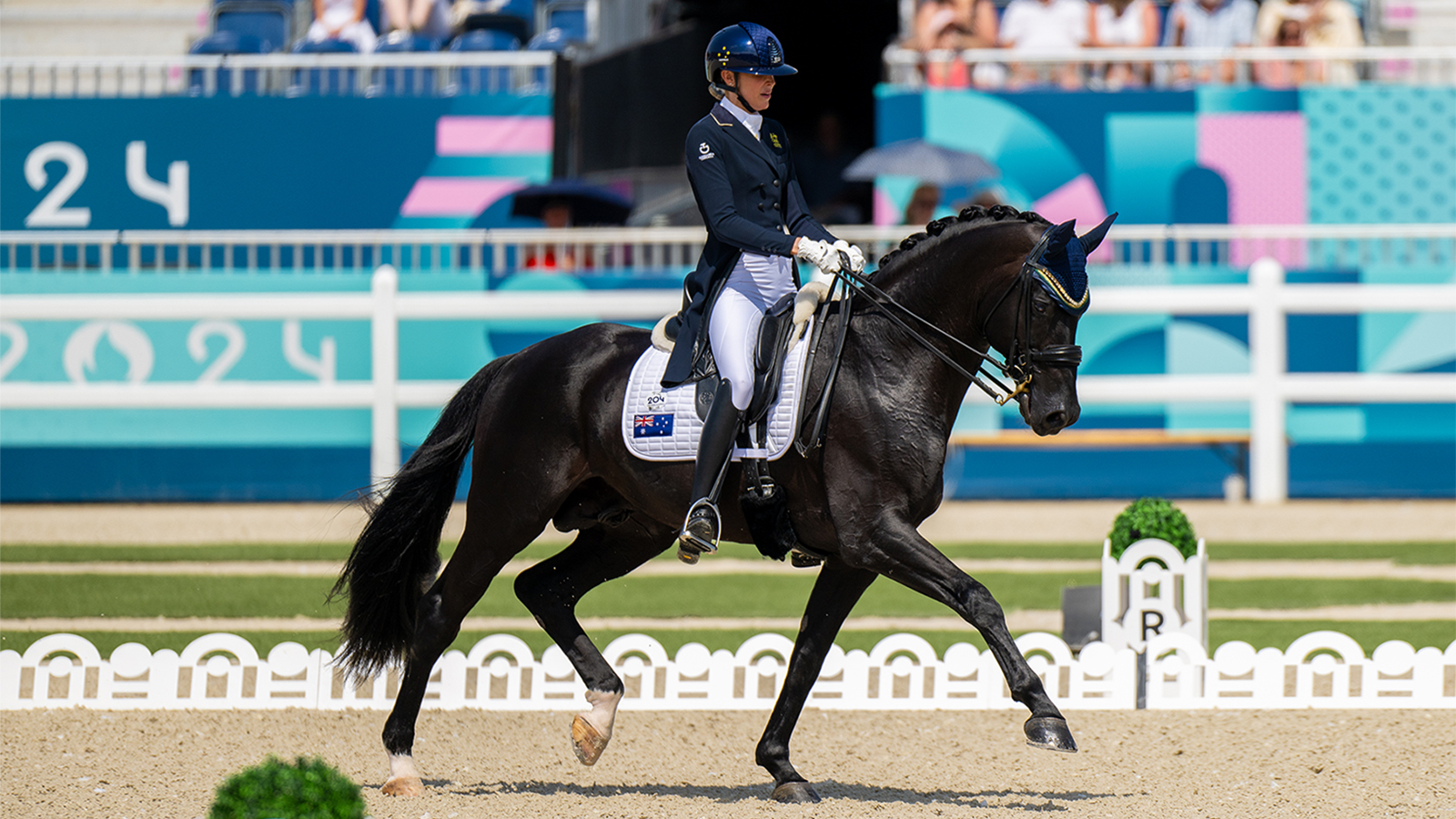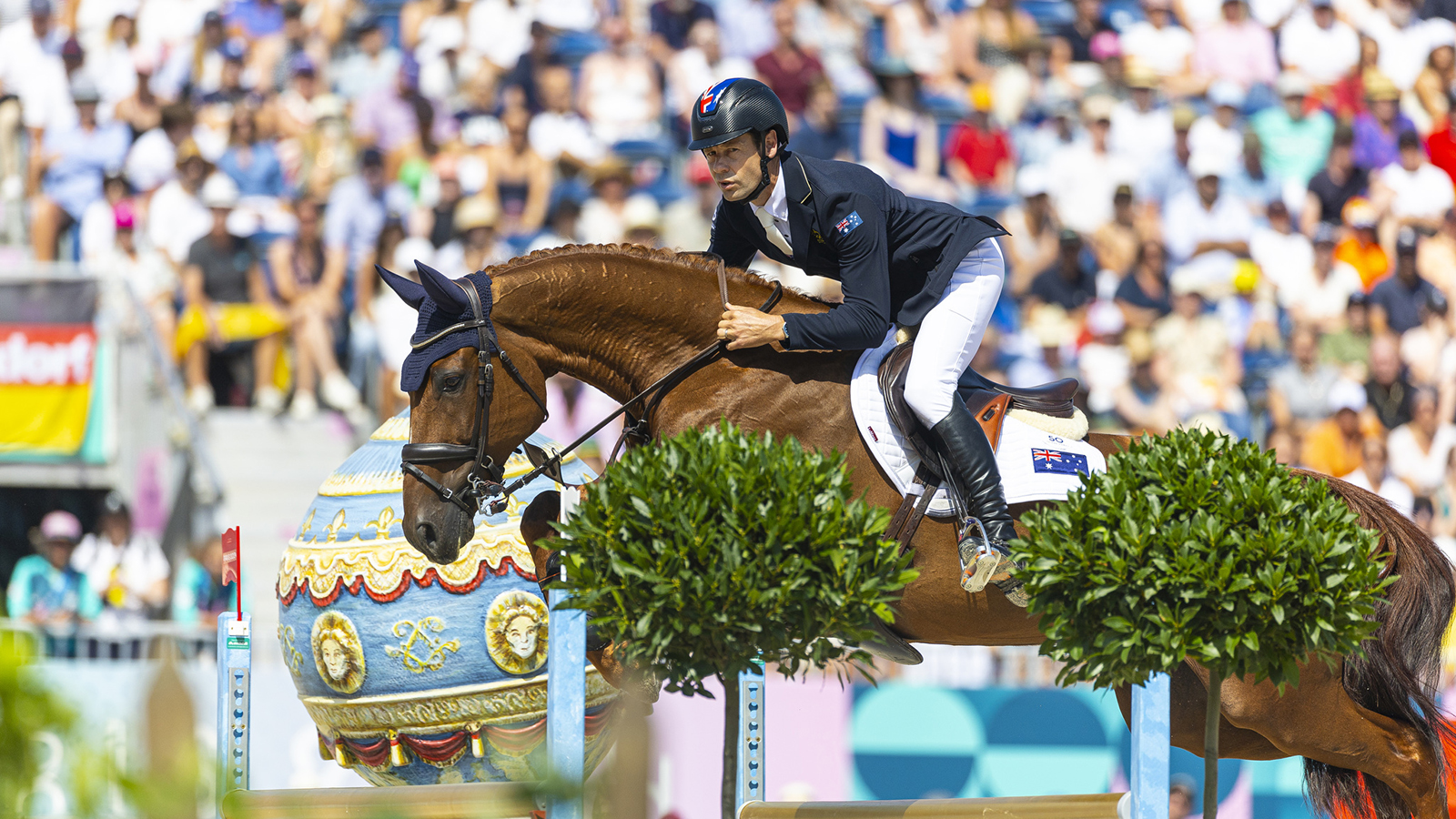Jenny Gehrke is well known in the Australian dressage scene. Having successfully trained several horses to FEI level and Grand Prix, with multiple championships at state and national level, she has a wealth of knowledge.
However, where Jenny’s superpower lies is in her coaching abilities. Anyone who has had the privilege of a lesson with Jenny will know that her method of communication, character, timing and ability to impart her training always improves the combination in front of her. Having trained with her myself for the last four years, there is not a day that I am not grateful for her wisdom and guidance that has helped me train my own horse to Grand Prix.
Jenny’s training philosophy is about the fairytale, creating a light, supple and engaged horse from the foundation of a harmonious partnership. You want to “create a horse that you could ride around a Grand Prix dressage test when you are 90 years old without breaking a sweat”, she says.

Jenny Gehrke riding Senator Nymphenburg at Willinga Park. Image by Roger Fitzhardinge.
“I genuinely enjoy
coming second to
someone I have trained.”
It is no surprise that her training schedule produces top scoring combinations, and over the 30 years as a full-time coach Jenny is “mostly proud of coaching riders to be more successful than I am. I genuinely enjoy coming second to someone I have trained just as much as I enjoy coming first.”
With a talent like Jenny’s, it is not surprising that she is the coach of many incredible riders. Most well-known is World Championship rider and now Olympian, Jayden Brown. Whilst Jayden has had the advantage of having Jenny as his coach on and off since he was 14 years old, there are many other riders who have benefited from her expertise over the years.

Jenny and Jayden with the late WillingaPark Fusion. Image supplied.
THE MILLION-DOLLAR QUESTION
Talking to Jenny, I asked the million-dollar question: what is it that makes a good rider?
“Natural talent plays a very small role,” she says. “It comes down to having a magnificent work ethic, being very resilient, having a feel and empathy for the horse, and having the temperament and calm disposition of the rider who wants to get the job done for the right reasons. The riders that really stand out to me are always open to learning and don’t let their egos prevent them from continuing to grow as a rider and a human.”
The first time Jenny taught Jayden Brown she knew straight away that he was a “freak!” He was so teachable and wanted to learn everything he could. Her ultimate philosophy is that when riders and coaches believe they know everything, that’s the moment they should stop riding. This is a sport that is constantly evolving and changing, and Jenny still has new “light bulb moments” in her training and coaching. This change can even be seen in how Jenny and Jayden’s relationship has evolved over two decades of friendship and coaching between them. What started as a coach giving a lesson has become two people with a lot of shared history and experiences, and respect and trust working together to unearth the best way to train each horse on any given day.
Whilst this formula for a good rider seems easy enough to create, then why is Australia not creating riders who can produce a podium-finishing team on the international stage?
Jenny says: “I think we are developing those riders, many of them, actually. We have amazing riders in Australia – including those based in Europe – horsemen and women equal to some of the best around the world. What other ‘developing’ dressage nations such as the USA and Great Britain have done to increase their international standings in the sport is implement elite athlete development programs that include increased financial support for riders.”

Jayden and Quincy with Jenny, pictured here at Dressage & Jumping with the Stars in Australia. Image supplied.
Carl Hester published a post showing the support and advisors for the GB Olympic Dressage team, while our riders don’t even get the opportunity to bring their own coaches, Jenny points out. “That right there is the difference – not enough support for the riders at the top level,” she highlights.
HIGH PERFORMANCE MODEL
“Changes need to be made in the structure of our High Performance model from the government down. Currently the government gives more funding once you win a medal. This is flawed as we need funding TO win the medal. The USA and Great Britain have clearly shown that this model works.
“The riders that I have worked with that have been really successful have had tremendous backing and support from the people around them. They get very little support that comes from our federation.”
Jenny notes that there is a higher emphasis on the grass-roots riders, and whilst they are pivotal to our sport, the elite are given very little backing. For example, Jayden received an invoice for parking his truck at the World Equestrian Games that he and his support team was required to pay on top of all the expenses of getting him to the World Championships. “We also don’t have the numbers of high-quality horses,” says Jenny. “Don’t get me wrong, there are many very wonderful horses bred here in Australia (Jenny’s upcoming horse Carool Apollo being one of them) but there are many more wonderful horses in Europe.”

Jenny with super groom Madeline Leeden at Carl Hester’s yard. Image supplied.
Having recently spent two weeks in the UK helping Jayden with his campaign for the Olympics and staying at the renowned yard of Carl Hester, I asked what it was like getting to experience life from the arena side of the King of Dressage.
“It was the most wonderful experience! Carl’s yard is Carl’s home and it feels like a home. All the horses are genuinely happy. In one of the most stressful times for them leading up to the GB team announcement, everyone was so calm, welcoming, relaxed and friendly.”
DRESSAGE RIDER’S DREAM
Getting to watch Carl coaching every day for two weeks is every dressage rider’s dream. “I’ve seen trainers I don’t ever want to watch train again, but Carl truly restored my faith in the sport. The passion and commitment to every rider was inspiring and reminding me that riders who love the horse first should not give up the sport. Everyone in their life has made mistakes, we all regret them and learn from them. It was heartening to see an elite level training barn that is such a happy place for all horses and riders within.”
“Carl truly restored my
faith in the sport…”

Jenny with Valegro. Image supplied.
I asked Jenny if Jayden had found Carl’s training system very different to hers. Jayden’s transition into Carl’s training methods was seamless, she explains. Nothing was really different but his timing and attention to detail is amazing.
“Jayden and I had attended clinics with UK judge and rider Peter Storr for many years and he had worked closely with Carl. The system wasn’t new to us. He is just better at it!” Jenny laughs.
Carl’s approach to training was to look for what was good and work out how to get more marks from that. “Jayden’s horses are adjustable, and he could put them wherever Carl wanted him to put them,” shares Jenny. “Carl would get riders to ride a movement, give them a score, give them an exercise, train the exercise and then do the movement again and show how it improved it.”
BACK-TO-BACK CDIs
“For Jayden to stay on the path to securing his team place for the Paris Olympics meant attending multiple CDIs. The opportunity for back-to-back CDIs is a foreign concept in Australia where we are lucky to get six CDIs in a calendar year. This few and far between arrangement leads to them appearing as a premium event. “In the UK, CDIs are almost like a regular competition, just with more paperwork. Everyone is relaxed, it’s just another show for them and there is one almost every weekend. This really allows riders to hone in and get accustomed to the high intensity of high-level competitions. This is another advantage of being based in the UK and European countries.”

Jenny and Jayden in Versailles. Image supplied.
What would Jenny recommend for the riders at home who want to get better?
“Set goals. When you set goals you make a plan, when you make a plan and work hard you reach your goals. When you set your goals, think about how you want to achieve them as well as what you want to achieve. Remain inquisitive and always seek to improve your knowledge. Be trainable! Stay confident in your own way but remain open to learning. Never lose your integrity and cross the line between getting the best from your horse and trying to make it something it can’t be. At the end of the day and most importantly remember why you started this sport; hopefully it was because of your love of horses. Look at our Australian team. It is filled with riders who have never given up and have kept their goal of the Olympics unflinching and now they have proudly represented us all.”

Jayden and Quincy B shone on the world stage in Versailles. Image by FEI – Benjamin Clark.
Jenny Gehrke’s journey and contributions to dressage are truly inspiring. Her commitment to creating harmonious partnerships, coupled with her own ever-growing knowledge, make her a cornerstone of Australian dressage. As Australia looks to build stronger teams and achieve greater success on the international stage, the insights and experiences of coaches like Jenny will be invaluable. As will her continued influence on riders throughout Australia. EQ




